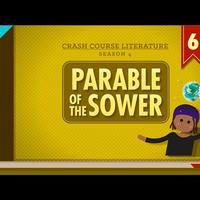The Parable of the Sower: Crash Course Literature 406 - YouTube (2)
and more that they'll learn new and better forms of relating to each other and to the
world around them, and that they will find something to unite them.
Instead of a search for a paradise where nothing ever changes, they have to learn to embrace
change and use that change to move forward and seek life among the stars.
Whereas so many utopian and dystopian novels seem to argue for dismantling technology,
Lauren sees this interstellar travel as a goal that can unite humanity.
As we come to the end of our miniseries on dystopias--although I suppose Macbeth is also
fairly critical of traditional power structures--I think it's worth pausing to consider the
if-this-goes-on-ness of Parable of the Sower.
What forces or goals can unite and pacify us?
We know how will humans of the past have responded to resource pressures and deprivations—is
there a way that we can somehow avoid their mistakes, when responding to the pressures
and deprivations of a changing climate?
And can we reconcile ourselves to change, and live with it, as The Book of the Living
calls us to do?
“Parable of the Sower” is so page-turningly, compulsively readable that it's easy to
miss the moments where Lauren, and Butler, speak directly to us and to our times.
So I want to leave you with a quote from one such moment in the novel.
Lauren writes, “Embrace diversity.
Unite— Or be divided, robbed, ruled, killed By those who see you as prey.”
Good advice.
I'll see you next time.

